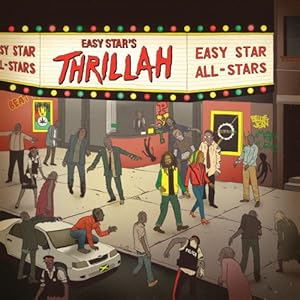 To connoisseurs of the cover song, NYC reggae collective Easy Star All-Stars remain re-interpretive royalty: their dense dynamics and musical versatility have garnered them positive notices in the reggae community, but their staggering full-length album tributes have garnered them the most ink. And with good reason: they’ve enlisted a small army of the genre’s luminaries to put a mind-melting, dubby spin on a small fistful of classic concept records, including Pink Floyd’s Dark Side of the Moon and Radiohead’s OK Computer.
To connoisseurs of the cover song, NYC reggae collective Easy Star All-Stars remain re-interpretive royalty: their dense dynamics and musical versatility have garnered them positive notices in the reggae community, but their staggering full-length album tributes have garnered them the most ink. And with good reason: they’ve enlisted a small army of the genre’s luminaries to put a mind-melting, dubby spin on a small fistful of classic concept records, including Pink Floyd’s Dark Side of the Moon and Radiohead’s OK Computer.
These albums work for several reasons. One, reggae stands alone with pop-punk as one of the most successful milieus in which to rework a well-known song: the genre’s rhythmic and melodic earmarks lend themselves well to almost any tune, rendering songs innately recognizable while still true to the artist at hand. Two, nobody truly dislikes reggae music; even the whitest fratboy on earth probably has a Marley poster on his wall (generally his lone concession to black music, but still), and fervently vibes out to latter-day students of the genre like Sublime and Fishbone. Three, the Easy Star guys have a leg up on the competition by being one of the tightest ensembles around, innately attuned to what makes their varied influences tick.
Easy Star’s Thrillah is a bit of a first for Easy Star All-Stars: it’s every bit as storied and popular as OK Computer or Sgt. Pepper’s, but Michael Jackson’s original LP is more of a hit machine than a cohesive, conceptual story arc. Boiled down to it’s bare essentials, Thriller‘s consistency generally comes from being a collection of immaculately performed and produced pop jams; this, by nature, makes Thrillah easily Easy Star’s most whimsical release to date. (And it’s likely to remain so, unless the All-Stars tackle Like a Virgin or Make It Big next.) Given this fact, the odds are almost stacked against Easy Star’s ability to lend reggae sheen to some of the most recognizable dancefloor-fillers of all time; given that, tempo-wise, reggae is traditionally a slower medium than most, how do you recreate a song’s innate danceability without veering into funk or ska?
Easy answer: you don’t. Album opener “Wanna Be Startin’ Somethin'” is pure funk, complete with rowdy drums and a bleating, insistent horn section; later on, “P.Y.T. (Pretty Young Thing)” more or less reassembles the iconic original sans instantly recognizable synth line. It’s an interesting gambit, but it would also be counter-intuitive to water down the frenetic tempos of the originals; as a result, they’re fun tracks, but unlikely to ever supplant Jacko’s perfect progenitors, since they bring little new to the table. (Compare this to Radiodread, Easy Star’s immaculate OK Computer tribute, an album that plays every bit as thrillingly as it’s original incarnation; it’s difficult to have a hankerin’ for Thom Yorke’s laconic “Let Down” once you’ve heard Toots Hibbert rip it open.)
Which isn’t to say that Thrillah doesn’t work: on the contrary, it’s often a terrific listening, particularly when it arrives at some challenging mega-hits. “Thriller”, for example, plays exactly as you’d assume a reggae “Thriller” would sound, with the correct percentage of awesome that implies; the dub rhythms and horn-reworked guitar line of “Beat It” sound fabulous in this context; and “Billie Jean” in particular benefits from a creeping, ominous reworking of one of the most paranoid, tense pop beats of all time. Singer Luciano’s simmering vocal matches MJ’s emotional tour de force note-for-note, and it’s glorious. Just as sweet is Cas Haley’s skeletal, steel-drum-tinged take on the slinky “Human Nature” (for my money, the record’s best deep cut, in the sense that Thriller has any truly deep cuts).
The fact remains that Thriller is a pop monolith, insanely universal, and uniquely suited to a project of this ilk; so it could be given the reggae treatment, or the rockabilly treatment, or the hair-metal treatment, and it’d probably be equally successful. That virtue alone makes Thrillah worth a listen; given how effortlessly it backpedals from reggae and dub to funk and dance, it’s perhaps the tribute record least representative of Easy Star’s authentic re-contextualizing aesthetic, but it’s also a breezy, fun listen. React accordingly, then, but don’t forget the rest of Easy Star All-Stars’ stellar ouvre; don’t act like Sgt. Pepper’s Lonely Hearts Dub Band isn’t positively screaming your name right now.
Grade: B+

1 comment
blerd says:
Sep 14, 2012
I gotta say I was impressed by this album. I didn’t think MJ and reggae could go together, but they do a commendable job here. Nice review, Drew.